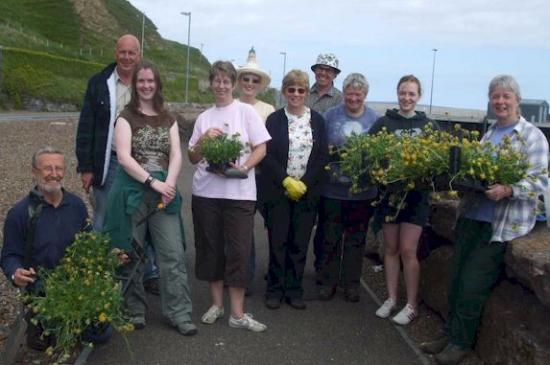Warm Weather Boosts Butterfly Volunteers
1st July 2009

A recent sunny Sunday (21 June) saw a strong team of Countryside volunteers turn out to help provide habitat for one of the small blue butterfly colonies in Caithness.
The most northerly colonies of small blues are located within the dune system at Dunnet Bay and also along the coast at Scrabster.
At Scrabster there has been construction works for the new harbour, and some kidney vetch (the only foodplant of the small blue butterfly caterpillar) has seeded into the gravel stone verges of the harbour road and roundabouts that lead to the ferry terminal.
It was proposed that the vetch population should be increased by collecting local seed. Shinval nursery grew these on to plug and plant size, and the resulting plugs and plants will be planted into the ground to increase cover at the harbour. It is also proposed to add other flowers such as mouse ear hawkweed, bird's foot trefoil and scabious for both butterfly and bee nectar.
The protection of the small blue butterfly is regarded as being of high priority throughout the British Isles as its population has fallen largely due to lack of habitat and also poor early summer weather (it is on the wing in June).
Another high priority species for the UK is the rare great yellow bumble bee, which has been seen along the track to the lighthouse where there is a wonderful mix of wild plants growing behind the dyke and up onto the braes and headland. It is hoped that the new plants will help feed the bees also.
This project is being led by Countryside Ranger Mary Legg on behalf of the Caithness Biodiversity Group, with support from the Scrabster Harbour Trust. It is funded through the Council's Landfill Communities Fund.
